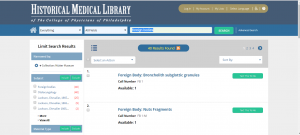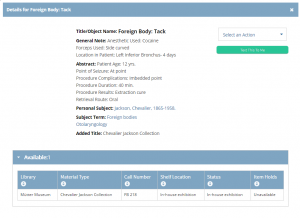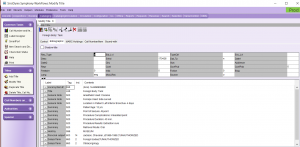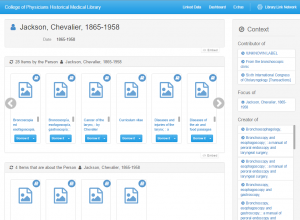On April 1st, the College of Physicians of Philadelphia released what we lovingly refer to as the “Digital Spine,” one of the few  catalogs in the United States that merges descriptions of, and access to, library, archival and museum collections.
catalogs in the United States that merges descriptions of, and access to, library, archival and museum collections.
Approximately 145,000 bibliographic records for collections in the Historical Medical Library and approximately 28,000 records for objects in the Mütter Museum will be merged in a single, cross-searchable database. To sample this integration, go to https://cpp.ent.sirsi.net/client/en_US/library and search for “foreign bodies.”

Museum records are slowly being released into the online public access catalog (OPAC). One of the biggest problems with integrating these two collections is the lack of standardization for describing museum objects (of any kind). In library description, we have “title.” In museum description, something akin to a title can be found in “Remarks” or “Description” or “Object Description” or “Object Name.” Building crosswalks between library and museum descriptions is an engaging activity.

Another problem is the interim use of the MARC format to catalog museum objects. The long-term goal of the Digital Spine project is to expose collections metadata to crawling by search engines. In order to do this, we had to start with MARC, which seems antithetical, since MARC is not a structure that is understood by search engines. The College selected SirsiDynix as the vendor for this project because of SirsiDynix’ recent release of its BLUEcloud LSP. BLUEcloud Visibility pulls a library’s records and transforms them using BIBFRAME, which exposes catalog records as linked data. Here, for example, is part of the “Person” record for Chevalier L. Jackson, the “father” of American laryngology, whose foreign body collection, items referenced above, is one of the first museum collections to be released into the OPAC.

In the near future, we anticipating spending a lot of time tidying museum records and releasing them to the OPAC; retrospectively cataloging original library material that never made it into the original conversion to electronic format; and working with SirsiDynix to create an archives “module” to accommodate hierarchically described collections. In the long term, we plan to expand the reach of our metadata as linked data – how extensible can we be? In answering that question, we will truly free the LAMs from the silo.





